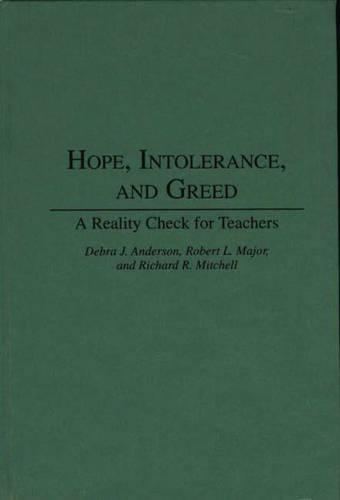
Hope, Intolerance, and Greed: A Reality Check for Teachers
(Hardback)
Publishing Details
Hope, Intolerance, and Greed: A Reality Check for Teachers
By (Author) Debra J. Anderson
By (author) Robert Major
By (author) Richard Mitchell
Bloomsbury Publishing PLC
Praeger Publishers Inc
16th January 1995
United States
Classifications
Tertiary Education
Non Fiction
Curriculum planning and development
Teaching skills and techniques
370.11
Physical Properties
Hardback
176
Description
In many ways America is in worse shape than before the first Watts riots occurred over 25 years ago. Intolerance is still abundant; greed is very much alive; and hope held by many at the bottom has been dimmed, if not extinguished. For our country to become everything it is capable of becoming and everything our ancestors dreamed, education cannot continue as usual. Ours is a great country, but when even one of its citizens is made to feel less than human or is robbed of their dignity, something is wrong. Hope, Intolerance, and Greed: A Reality Check for Teachers encourages teachers to question the status quo and to reexamine their power to influence the direction our country takes into the 21st century. It also encourages teachers to acknowledge the realities that exist, teach the rejection of violence, and promote an awareness and understanding of people as individuals.
Reviews
.,."Hope is the main message in this book and education is the source of that hope....Teachers...would readily acknowledge their potential power in shaping society via the children they serve. This book's research and literature references will bring to the surface these understandings. For example, I was stuck anew with the idea that optimism may affect achievement more so than talent. Teachers are the key. While written primarily for teachers and teacher educators, this book has valuable information for anyone who needs a rationale on why education should be supported."-The Journal of Educational Relations
...Hope is the main message in this book and education is the source of that hope....Teachers...would readily acknowledge their potential power in shaping society via the children they serve. This book's research and literature references will bring to the surface these understandings. For example, I was stuck anew with the idea that optimism may affect achievement more so than talent. Teachers are the key. While written primarily for teachers and teacher educators, this book has valuable information for anyone who needs a rationale on why education should be supported.-The Journal of Educational Relations
..."Hope is the main message in this book and education is the source of that hope....Teachers...would readily acknowledge their potential power in shaping society via the children they serve. This book's research and literature references will bring to the surface these understandings. For example, I was stuck anew with the idea that optimism may affect achievement more so than talent. Teachers are the key. While written primarily for teachers and teacher educators, this book has valuable information for anyone who needs a rationale on why education should be supported."-The Journal of Educational Relations
Author Bio
DEBRA J. ANDERSON is Associate Professor and chair of the Department of Education at St. Olaf College in Northfield, Minnesota. ROBERT L. MAJOR is Professor in the Department of Curriculum and Instruction at Mankato State University. RICHARD R. MITCHELL is Professor in the Department of Curriculum and Instruction at Mankato State University. All three have coauthored Teacher Supervision that Works: A Guide for University Supervisors (Praeger, 1992).
